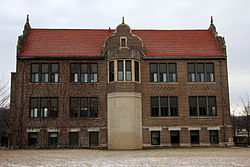Winona State University
 |
|
| Motto | A Community of Learners Improving Our World |
|---|---|
| Type | Public |
| Established | 1858 |
| Endowment | $38.3 Million |
| President | Scott R. Olson |
| Students | 9,993 |
| Location | Winona, Minnesota, United States |
| Campus | Small city |
| Colors | Purple and White |
| Nickname | Warriors |
| Mascot | Wazoo |
| Website | www |
 |
|
| University rankings | |
|---|---|
| National | |
| Forbes | RNP |
| Regional | |
| U.S. News & World Report | 71 |
| Master's University class | |
| Washington Monthly | 294 |
|
Model School Building and College Hall of the Winona Normal School
|
|

The Model School, now called Phelps Hall, the oldest building on campus
|
|
| Location | 416 Washington Street and 151 W. Sanborn Street, Winona, Minnesota |
|---|---|
| Coordinates | 44°2′52″N 91°38′33″W / 44.04778°N 91.64250°W |
| Area | Less than one acre |
| Built | 1915 (Model School), 1924 (College Hall) |
| Architect | Clarence H. Johnston, Sr. |
| Architectural style | Jacobethan (Model School), Collegiate Gothic (College Hall) |
| NRHP Reference # | 13000884 |
| Added to NRHP | December 3, 2013 |
Winona State University (WSU) is a public university located along the historical heart of Winona, Minnesota, United States. Winona State University was founded as Winona Normal School in 1858 and is the oldest member of the Minnesota State Colleges and Universities System. It is notable as the first university to be established West of the Mississippi River.
WSU offers more than 80 programs on its main campus, as well as collegiate programs on satellite campuses at Winona State University-Rochester and the Winona, Wset Campus. Average annual enrollment of approximately nine thousand enrolled undergraduate and graduate students. Its sports teams compete as the Winona State Warriors in the NCAA Division II athletics in 14 sports, primarily in the Northern Sun Intercollegiate Conference.
Winona State University was founded as the First State Normal School, an institution specifically for educating and producing new elementary school teachers. In the 1850s Minnesota was on the American frontier and lacked trained teachers. Winona settler Dr. John Ford lobbied the Minnesota Legislature to establish normal schools and rallied more than $5,000 in local donations to establish the state's first such institution. It was also the first tax-funded school west of the Mississippi River.
Classes at the Winona Normal School began in September 1860, but the following year most of the male students as well as the principal and other staff left to serve in the American Civil War. The school closed from March 1862 to November 1864, and its first class graduated in 1866. The program soon added a laboratory school in which local children received education from faculty while students observed or, occasionally, led lessons themselves. The normal school quickly outgrew its original four-room building, but state funding and local donations of money and a plot of land led to the construction of a proper facility in 1869.
The campus expanded with two new wings on "Old Main" in 1894, a library/gymnasium/kindergarten building—Ogden Hall—in 1909, and a women's dormitory—Morey Hall—in 1910. In 1915 a new building was constructed to house the laboratory school, and a second women's dormitory—Shepard Hall—appeared in 1920.
...
Wikipedia


